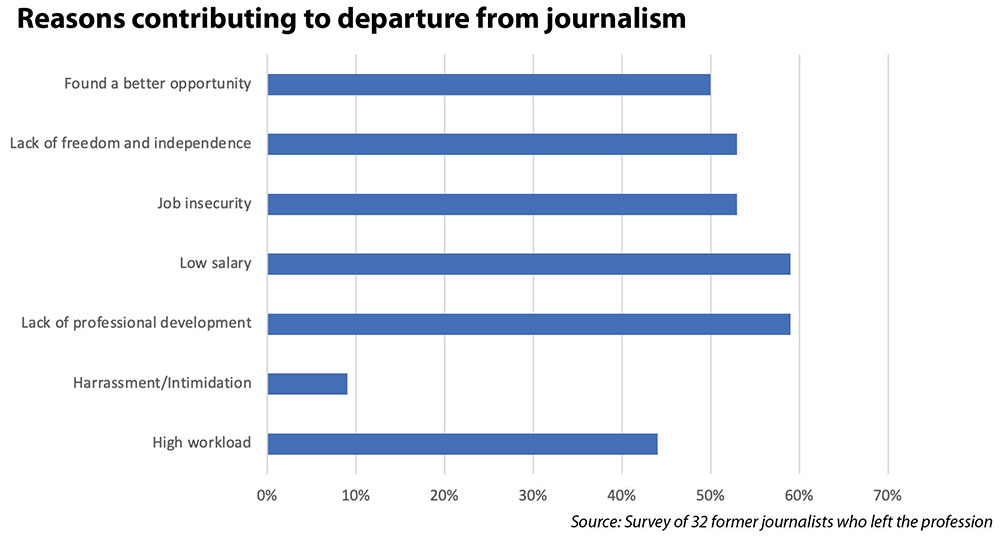With the National Assembly elections coming up on November 30 and January 9, the role of the media in Bhutan’s young democracy is being spotlighted. Objective, thorough reporting is essential for investigating the most pressing social challenges and sharing the platforms of parties vying for the chance to address them.
However, according to human resources records of one of the top news agencies (Kuensel), the number of journalists fell by 37% from 2021 to 2023, with only four out of 15 vacancies filled over the past two years. Other agencies are experiencing similar workforce challenges. While the departure of educators, civil servants, and health professionals has been featured in the headlines over the past year, little attention has been devoted to the attrition ongoing in the media itself.
To understand the issues driving journalists out of the profession, the Centre for Bhutan & GNH Studies conducted a survey of 63 professionals who worked as a journalist in the past five years. 32 out of 63 had left the profession (“leavers”) while 31 stayed in the media (“stayers”).

Statistically, there is no difference between stayers and leavers in terms of sex (half female), age (mostly between 31 and 40 years old), marital status (mostly married), number of children, and years of journalism experience. They were also equally inquisitive, and equally passionate about the journalism profession, according to self-reporting.
But stayers were significantly more likely to self-identify as comfortable with questioning authority. Stayers tend to have less education than leavers. And leavers had covered several topics in more depth than stayers do, including corruption, mental health, human trafficking, the queer community, and investigative reporting. It remains to be seen whether stayers will fill the void left by leavers on these topics.
Of those who left the profession, 66 percent left in the past two years, and 44 percent left the country (for Australia in almost all cases). The rest remain in Bhutan but are no longer working as journalists. Of the leavers, 19 percent are now unemployed, while the other 81 percent have moved on to new jobs, notably including teaching (in Bhutan) and aged care (in Australia). When asked about reasons for leaving the profession, low salary and lack of professional development came out as the most common complaints.
And what of those who remained in the profession? Of the stayers, 40 percent expressed dissatisfaction with their pay, and 43 percent claimed to be actively searching for ways to change their employment status. However, a large proportion of stayers (two-thirds) claimed that a feeling of duty and service kept them working in the media.
All survey respondents, whether they stayed or left, were asked to reflect on the state of journalism in Bhutan. Stayers and leavers alike commented on the importance of journalism for building accountability and transparency in Bhutan’s young democracy. Lack of access to information was a common concern, with nearly two-thirds of the 63 respondents identifying this as the main challenge for journalists working in Bhutan. For instance, a former reporter shared how her story about lapses in procuring a Nu. 4.3 million incinerator remained incomplete because she could not access information and officials refused to talk. According to a survey conducted by the Journalists Association of Bhutan in August 2022, the Prime Minister’s Office received the highest rating on providing access to information, and may serve as an example for other offices and future governments.
The implications of the departure of journalists remain to be seen. The former and current journalists have views on the likely impact of a weakening journalism workforce. Some expressed concern that the loss of experienced journalists would reduce the volume of in-depth stories and availability of mentors for young journalists, all with a detrimental effect on public trust and democratic processes.
However, others expressed belief that the departure of journalists would not impact democracy. In their view, Bhutanese journalists have not significantly influenced important public debates over the last 15 years of democracy. One respondent stated that there hasn’t been a substantial impact so far, and predicted that the Bhutanese media will continue to serve as a mouthpiece for the government.
The survey responses provide some hints as to how journalist retention can be improved. Fostering professional development seems to be one key. This would include not only training and advancement opportunities but also building an enabling environment in which journalists can access the information they need to explore topics close to their hearts. Such investments will help ensure that the media continues to grow into serving a critical role in Bhutan’s democracy.
Contributed by
Yangchen C. Rinzin
Research Fellow, Centre for Bhutan & GNH Studies
Milan Thomas
(@drukonomist)
Economist, Asian Development Bank

